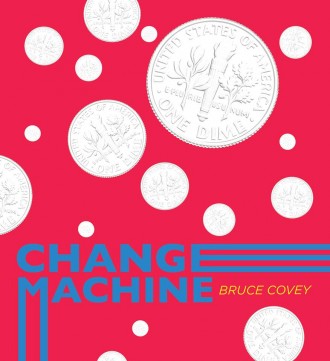A Review of Change Machine
01.07.14
 Change Machine
Change Machine
Bruce Covey
Noemi Press
122 p. / $15.00
Loose change, neat little solids of currency that can pay for the leftovers of cost—the extra 3 cents at the register, the 75-cent candy bar in the vending machine, the coveted and hard-to-part-with quarters that plunk into the parking meters—are a part of the unrelenting cultural thingness in Bruce Covey’s latest, Change Machine from Noemi Press. Coins are easily recognized as offering value and exchange, but Covey’s collection points out the value that all objects contain. That is a vague statement for what is a precise book. I mean, everything is a part of the Change Machine world; there is the particularity of molecular lattices, industrial processes, apropos remarks, one-second memories, and they all manage to avoid any twinge of exclusiveness. There is something exciting about the evenly-paced Change Machine. There is no sinister overwhelming, there is Covey to catalogue and curate, to point out the hidden objects in the visual and psychic goulash. Covey’s poems sustain because it is not an apocalyptic piling-on of substances, it is a good-humored acknowledgment of the individual pecks that make up our pointillistic postmodern.
Covey writes poems that are interested in objects of culture, but a book like Change Machine does not overtly align itself with any camps like meta-modern, alt-lit, hyperinformation. Covey embraces all, and tinkers away at the specifically contemporary as they come along, coming up with—what? The first section of Change Machine, entitled “Tails,” for instance, is a laboratory of considerations.
Fee
Iron filings
Iron replica of a steamboat, particularly gliding
Iron assessment, iron talons
Iron prediction of a flat race
Iron vegetarian
Iron calendar
Iron tiny rivets scattered throughout the crawl space
Iron characters—the iron man who couldn’t walk
An iron cane, iron platter spinning
Decoding iron stamps on an iron love letter
The drag of iron, an anchor
Scratching at the iron sediment
Water oxidized, hard water, iron you feel
Yourself wiggling your toes in it
Tide cascading over
& dissolving you with it
An iron sand dollar
There is often a transformation in these poems: an introduction to what is material or chemical, an addition of something sensory that makes us human (i.e. experiences, unabashed argot, feelings, many times mundane, always asserted as valid, current references that could be labeled as daring or brave, but used by Covey as if natural and casual), and then the opening up of a treasure box that will never snap closed.
The second section, of course, is entitled “Heads,” and features the products of experiments in form, thought, and substance. There are the sonnets after Berrigan, a poem after Notley that outlines the dramatic arc of cement-inventing (just look it up), surrealist poems, erasures, conversation with a beleaguered moon persona (“Fuck off. & don’t ever call me Diana!”). Lines are carried out with kindness, even in the poem “I’m a Bitty Cupcake” (“But if you fuck with me, I’m gonna kick your fuckin ass, you know what I’m sayin?”). You trust that the transcription of identity is not meant to be edgy, or even subversive. When someone asserts that they are a bitty cupcake, you accept their emphatic caveat as a clarification of their danger, or pain, or insecurity. Covey provides this humorous, gentle reminder. The lines also do not shirk from what is painful, but by direct juxtaposition with materiality and science neither do they elevate the self over the microscope of life:
[from “Gilded Elegies”]
Today I saw a golden lab dead by the side of the road. Someone had covered its face with
a baby blue blanket.
Rather soft and malleable, copper is a ductile metal, with very high thermal and electrical
conductivity.
An hour before class I received a slip of paper in my departmental mailbox informing me
that one of my students was dead of suicide, a shotgun blast to his face.
Over 60% of all the magnesium in the body is found in the skeleton, with 27% found in
muscle.
Change Machine is a full, full book. It is one big demonstration manifesto, an incorporation of the electric and robotic with the human interjections of rounding the bases and flying Delta. Or perhaps the other way around—the electric and robotic are interjecting the human. Or perhaps there is no hierarchy at all, but an utterly expansive approach to poetry. I doubt the Twitter quotes will ever feel dated, because Covey’s tactic of incorporation is anything but static. The wordplay looks forward, and though often recognizably informed by process, the frenetically, dauntingly automatic is mediated by the accessible.
[from “Pantoum on Art”]
Every time I put my hands in my pockets I find
A haze of tulip petals & the hollow slap of air conditioning
She winds her way back to my studio
What’s the name of that park?
A haze of tulip petals & the hollow slap of air conditioning
A baffling chain that never seems to finish
What’s the name of that park?
The popular image is part of my landscape
…
As threatening and insistent as possible
She winds her way back to my studio
Time batters the surface of the earth
Every time I put my hands in my pockets I find
The Change Machine happened when The Change Machine took over its materials, and if for purely self-interested reasons, you should let it take over your life for a while too. There is a feeling of honesty and sincerity in the poetic funning that happens, and it infects you while you are immersed. Poetry and life are the same thing, thank goodness, and process and poetry the same, and Covey and poetry are the same thing—thank goodness!